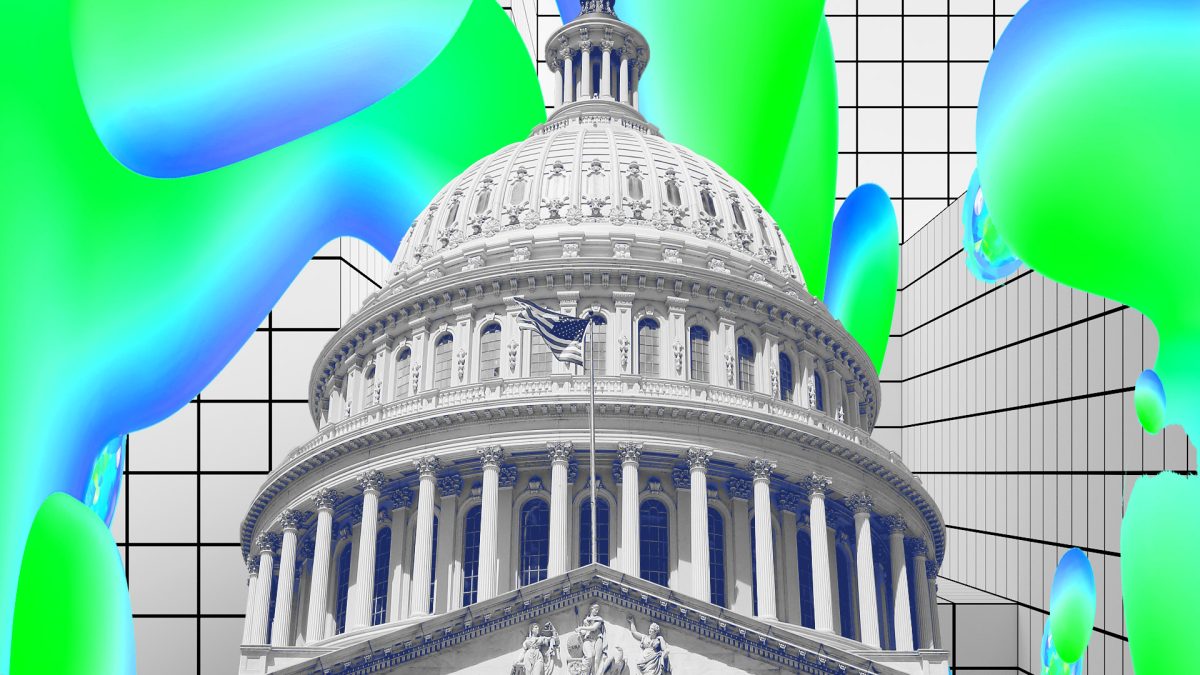Senior House Republican, Democrat talk up need for stablecoins law

Quick Take
- Senior members of the Financial Services Committee in the U.S. House of Representatives talked up the need for stablecoin legislation, which will likely to come to a vote before their committee this month.
- The pair suggested House Republicans, Democrats, and parts of the Biden administration are likely to come to an agreement on a path forward for a comprehensive framework for stablecoins.

Republicans want a state-level pathway for the approval and regulation of stablecoins, but they agree with Democrats that they should not create a “race to the bottom” for guardrails around the digital assets, said one of the authors of that bill on Monday.
“We do want to facilitate a state pathway, but to quote my colleagues on the other side of the aisle, we don’t want any race to the bottom,” said Rep. French Hill, R-Ark., a senior member of the Financial Services Committee in the U.S. House of Representatives, during an online event with the Atlantic Council, a Washington-based thinktank. He added that under the current draft of the legislation, stablecoins would fall under review or enforcement by the Federal Reserve.
Fed Chair Jerome Powell told Congress during testimony last month that the central bank should play a role in regulating the payments tokens.
In the same livestreamed interview with the Atlantic Council, Rep. Jim Himes, D-Conn., a senior Democrat on the Financial Services Committee, acknowledged the state versus federal policy tension in the stablecoin debate but said he didn’t see it as an insurmountable hurdle to a bill becoming law.
“We always have these arguments with the regulation of any financial product,” said the Connecticut Democrat. Himes added that proof of full one-to-one backing of stablecoins mattered the most of any provision, indirectly referencing the high-profile Terra/Luna collapses last year.
Hill said he hoped that comprehensive regulatory frameworks for stablecoins and crypto markets in the U.S. would advance out of House committees before the end of July, and Himes also expressed optimism about where talks stood for a stablecoins bill.
“The conversation happening right now is more between the committee and the regulators, and the conversations are happening I think formally and informally as we all work, I think, in good faith,” said the Connecticut Democrat.
Trying to reach consensus
Congressional Democrats have voiced some skepticism around a Republican-led market structure bill. The legislation would grant the Commodity Futures Trading Commission broader oversight power over bitcoin and other agreed-upon digital commodities markets while directing regulators at the Securities and Exchange Commission and CFTC to make clear the legal pathway for a digital asset to go from being a security investment to a commodity, an asset class with lighter regulatory disclosure standards. House Republicans have paired the two bills, given the role stablecoins play in cross-currency transactions within cryptocurrency markets, but delayed debate and a vote on them at the House Financial Services Committee by a week, suggesting more talks are needed to build consensus on the bills.
A federal judge’s split decision in a closely-followed case brought by the SEC against Ripple, a company that has sought to use its native token, XRP, as a traditional payment network alternative, may give more momentum to talks. The judge ruled that some of Ripple's XRP sales did not violate securities laws, because of a blind bid process in place for them, so buyers did not know the sales benefited Ripple. However the judge in the case said that other direct sales of XRP to institutional investors, who knew Ripple sold it to them, did violate securities law, and set the table for a trial over whether Ripple executives are liable for those violations; the case is likely to be appealed.
Another factor that could point toward a deal on digital assets between lawmakers of both parties is that federal regulators last year recommended legislation to create more direct oversight of digital asset spot markets and to put a comprehensive framework for stablecoins in place.
Though Republicans, if unified in their narrow majority, can advance legislation out of the House of Representatives by themselves, Democrats control the Senate and White House, so for any bill to become law it would need sign off from the Biden administration and most Senate Democrats.
Guarded optimism
Both Hill and Himes accentuated bipartisan support for getting a stablecoins bill done, even though Himes characterized himself as more of a skeptic of stablecoins.
“I am a skeptic on areas of mechanisms of exchange and stablecoins, but I also know that I’ll be wrong in certain areas, and that there is a huge amount of value there waiting to be innovated into existence and we need to make sure that that happens here, rather than somewhere else,” said Himes.
Asked to predict where debate on digital asset policy in Congress would stand a year from now, Hill expressed optimism about having a stablecoin law in place, but hedged a bit on the markets legislation.
“I’d like to say that a year from now we’ll have a stablecoin bill signed into law and we’ll have consensus on the regulatory architecture,” the Arkansas Republican said.
© 2025 The Block. All Rights Reserved. This article is provided for informational purposes only. It is not offered or intended to be used as legal, tax, investment, financial, or other advice.







